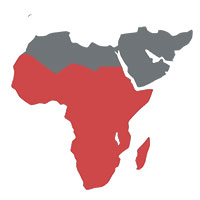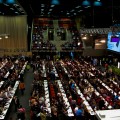“We must not lose momentum” – Ban Ki-moon
Tim Hall | December 7, 2011.
The opening of the High-Level Segment of the 17th United Nations climate negotiations (COP17) took place in Durban on Tuesday in the presence of South African President Jacob Zuma, UN Secretary-General Ban Ki-moon, COP 17/CMP7 President Maite Nkoana-Mashabane, and the UN Framework Convention on Climate Change (UNFCCC) Executive Secretary Christiana Figueres.
Figueres said in her opening statement that the time has come to address thorny political issues: the Kyoto Protocol, long-term funding and the future of the framework. She commended the good progress on support to developing countries – such as the Nairobi Adaptation Plan and the Green Climate Fund.
“We need clarity on the Kyoto Protocol and the gap between commitments should be ruled out. We need clarity on funds that will be scaled out from now until 2020,” Figueres said.
The Kyoto Protocol commits 37 developed countries to reducing carbon emissions to 5% below 1990 levels by 2012. Negotiations have been deadlocked as countries decide whether to sign, by week end, for a second-commitment period.
Even without a deal by the end of this week, the UNFCCC and the Kyoto Protocol will still exist, but would not enforce carbon cuts.
Mashabane said she has encouraged the negotiators to work in a flexible, transparent and elusive way. “Talk with each other, not past each other,” she said. She asked parties to show willingness to go beyond national interest.
“I have received a memorandum and various petitions from rural women, youth and religious groups who are expecting solutions from us to enrich lives. We have a responsibility not to disappoint them.”
Mashabane believes that Durban is the deciding moment of the future of climate change. “We need to decide in the final week – what to do now, and what to do in the future. Durban will secure the platform of trust.”
Ban urged the head of states and heads of government, ministers, negotiators and delegates, to adopt the second commitment of the legally binding Kyoto Protocol.
“We must be realistic about the outcome of Durban. We are faced with economic troubles and political differences. The Kyoto Protocol might be out of our reach for now.”
He urged the parties to keep moving forward. “It’s like riding a bicycle – you stay upright and move forward as long as you have momentum. We must not lose momentum.”
Ban stated that the science is clear – “the very existence of some nations is at stake. By 2050 greenhouse gases must be reduced by half. The International Energy Agency says we are beyond the point of return.”
He shared a story of his visit to the Kiribati islands, when a local boy told him that “he was afraid to sleep at night, because the island is slipping beneath the waves.”
“I’ve met thousands that have lost everything in disasters. Is this the future we want? An out of control changing climate? A bigger divide between rich and poor? Or do we want a sustainable future? Now is the moment to be ambitious.”
He added that he awaits tangible progress on long-term and short-term financing. “For short-term, we want greater transparency on how it is allocated and dispersed. For long-term, we need $100 billion by 2020.”
“Business, private sector and civil society has recognized the threat of climate change, and they are acting. The rest of the world is waiting for us to decide.”
The president of Republic of South Africa Jacob Zuma, said “we need to show the world the parties are ready to address climate change in a practical manner.” He further stated to ensure the rebuilding of trust, honest commitments and solutions should be proposed in Durban and followed through.
“We need to share the load of climate change. A global challenge requires global solutions.”
Zuma believes that developed countries should take the lead in reducing greenhouse gas emissions and provide support to developing countries. He suggested that there be a shift from analyzing the need for adaptation towards practical adaptation implementations on the ground.
“We all agree that the earth is in danger and we must act, but the problem comes in when we ask what and how.”
The European Union has visibly shown its support for the Kyoto Protocol, and wants a deal agreed by 2015 that would take effect no later than 2020.
On Monday, China, the world’s biggest carbon emitter and one of the countries that did not ratify the Kyoto Protocol, hinted it was ready to commit to a legally binding agreement on climate change. However, the US, Japan, Canada and Russia are refusing to be bound by it.
By Tim Hall, photo by Laura Owsianka.













comment